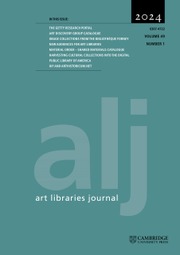No CrossRef data available.
Article contents
Lost in translation: the challenges of multilingualism
Published online by Cambridge University Press: 06 June 2016
Abstract
Art information increasingly operates in a global environment, but does not have the benefit of a lingua franca which some other disciplines enjoy. Art information continues to be generated in a variety of vernacular languages, which limits cross-cultural understanding and exchange. Easy access to cheap, instantaneous and accurate translation would be the ideal but this is unlikely in the foreseeable future. A selection of online initiatives and tools is assessed in this article in an attempt to identify potential trends and opportunities.
- Type
- Research Article
- Information
- Copyright
- Copyright © The Art Libraries Society 2012


